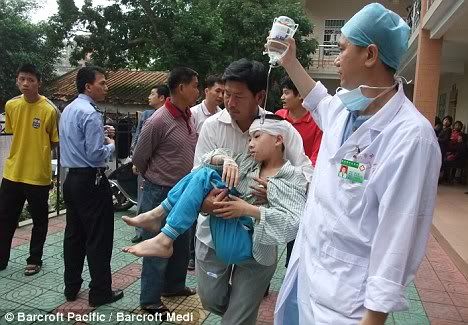
The latest attack comes after a knife-wielding man attacked chiildren in Leizhou No.1 Primary School on Wednesday in Leizhou, Guangdong province of China. Here, an injured student is taken to hospital after the attack
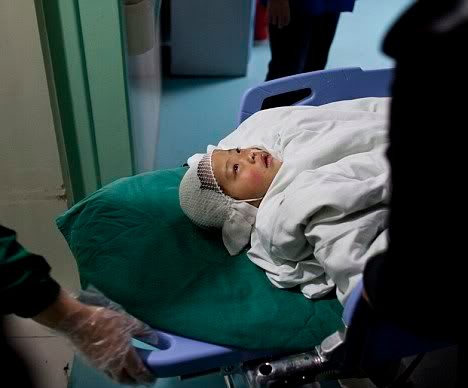
Experts say Wednesday's attack was a copycat rampage of two other episodes at Chinese schools in the past month
The latest attack comes after a knife-wielding man attacked chiildren in Leizhou No.1 Primary School on Wednesday in Leizhou, Guangdong province of China. Here, an injured student is taken to hospital after the attack
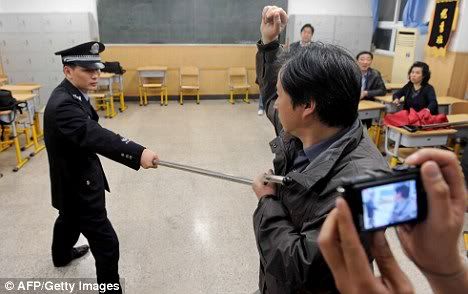
After the spate of copycat rampages, many schools are said to be concerned they will be targeted next
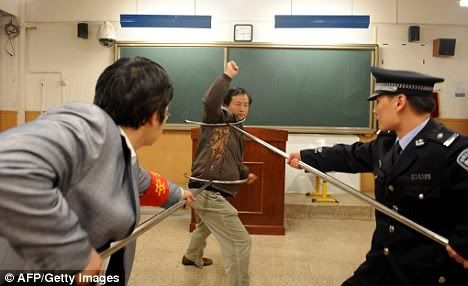
Following the attack yesterday, Chinese policemen have travelled to schools to show teachers and school workers how to defend themselves if they are targeted
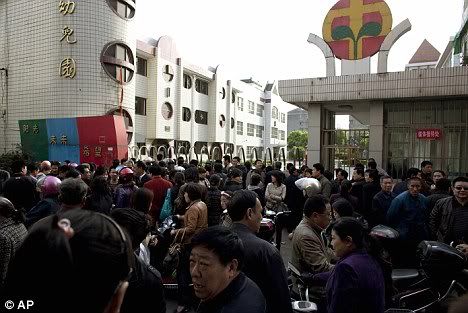
Concern: Worried parents gather outside the gate of the kindergarten where a class of 4-year-olds were attacked
A farmer attacked and injured five primary school children with a hammer in eastern China today before burning himself to death.
The sickening attack is the latest in a string of horrific assaults on young students over the last month, state media reported.
The attacker used a motorcycle to break down a gate of the school in Shandong province's Weifang city, struck a teacher who tried to block him and then used the hammer to attack the children, the official Xinhua News Agency said.
The assailant then grabbed two children before pouring petrol over his body and setting himself on fire.
Xinhua said teachers at the Shangzhuang primary school were able to pull the children away to safety, and none of the injured children had life-threatening injuries.
Xinhua identified the attacker as Wang Yonglai, a local farmer, but had no further details.
China has been reeling from a series of attacks on schoolchildren, with the latest incident coming just a day after a 47-year-old unemployed man rampaged through a kindergarten in Taixing city in Jiangsu province, wounding 29 students aged four or five years old, five of them seriously.

Horror: Drops of blood are seen on the steps of the kindergarten in Taixing, where a knifeman injured 28 children, two teachers and a security guard on Wednesday
Scene: A policeman enters the Zhongxin Kindergarten, where 31 people were injured by a knife-wielding man
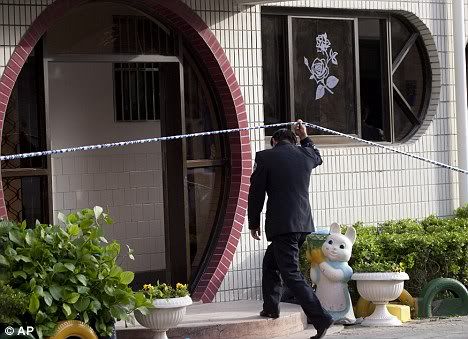
Scene: A policeman enters the Zhongxin Kindergarten, where 31 people were injured by a knife-wielding man
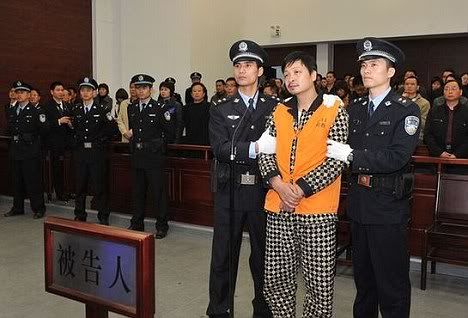
Former community doctor Zheng Minsheng, 41, was held by police in a courtroom before he was executed on Thursday for murdering eight schoolchildren
They said the wave of school attacks falls amid poor care for the mentally unstable and growing feelings of social injustice in the fast-changing country.
The attacker in Taixing, identified as Xu Yuyuan, pushed his way into a classroom with an eight-inch knife after two teachers and a security guard failed to stop him.
Xu had been a salesman in a local insurance company until he was fired in 2001, but since then has remained jobless, Xinhua said.
On Wednesday, a man in the southern city of Leizhou broke into a primary school and wounded 15 students and a teacher in a knife attack.
The suspect, 33-year-old Chen Kangbing, was a former teacher who had been on sick leave since 2006 for mental health problems.
The assault left fourth and fifth graders with stab wounds on their heads, backs and arms, but none was in life-threatening condition.
That attack came on the same day a man was executed for killing eight children outside an elementary school last month in the south-eastern city of Nanping.
It was not known if Xu knew about the previous day's attack in Guangdong, but Zhou Xiaozheng, a sociology professor at Renmin University in Beijing, said these sorts of violent attacks often happen in clusters because one may trigger copycat attacks.
'It's like suicide, which is another type of mental health problem that can spread in a community,' said Zhou.
'Normally, with these kind of violent events we hope the media won't blow them up too much. Because that tends to make it spread.'
The attack in March shocked China because eight children died and the assailant had no known history of mental illness.
At his trial, Zheng Minsheng, 42, said he killed because he had been upset after being jilted by a woman and treated badly by her wealthy family.
Another attack earlier this month occurred when a mentally ill man hacked to death a child and an elderly woman with a meat cleaver near a school in southern Guangxi, and wounded five other people, including students.
The series of school attacks in China in recent years have mostly been blamed on people with personal grudges or suffering from mental illness, leading to calls for improved security.China's inadequate mental health network has left millions of unstable people without the help they need.
Many otherwise healthy Chinese also feel frustrated and powerless because they aren't able to adapt to the constant social upheaval and because they believe the changes favour the corrupt.
That kind of anger has occasionally erupted in mass violence and in isolated attacks.
It is not known why schools are targeted.
A survey of mental health in four Chinese provinces published in the Lancet in June concluded that China likely had about 173 million adults nationwide with mental health disorders.
The report claimed that most, 158 million, had never gotten any professional help for their problems.
Yu Jianrong of the Chinese Academy of Social Sciences has said China's sweeping social changes might be partially to blame for Zheng Minsheng's anti-social rage.
'A social environment lacking fairness and justice, in which those who abide by the rules gain nothing, while those who do not can profit, could bring about resistance by the weak against the entire society,' Yu was quoted as saying by the Southern Weekly newspaper a few weeks after the attack.
Zheng was executed on Thursday, just weeks after his crime. Zhou, the Renmin University professor, said China's use of capital punishment helps fuel the cycle of violence by enforcing a belief in 'blood for blood'.
He said China should abolish the death penalty, improve human rights and make its justice system more fair and transparent.
After a 2004 attack at a school in Beijing that left nine students dead, the central government mandated tighter school security nationwide.
The Ministry of Education did not immediately respond to a fax today asking whether the attacks would result in orders to step up school security.
In Thursday's attack, in which a teacher stabbed fourth and fifth graders in their heads, backs and arms, Xinhua said the suspect suffered from mental illness and had been on sick leave from another school since February 2006.
He is now in police custody.





0 comments:
Post a Comment